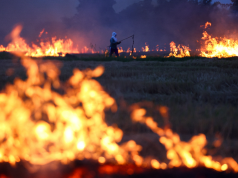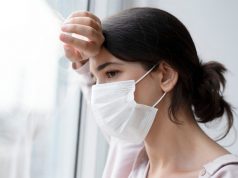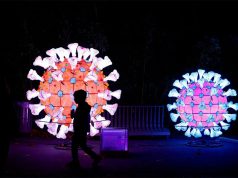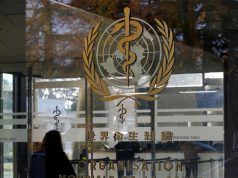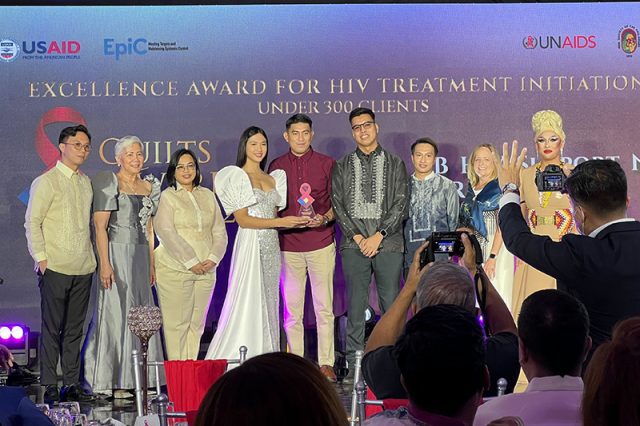
A number of health facilities and partner organizations were recognized for their outstanding efforts in providing care and treatment to people living with HIV (human immunodeficiency virus) in a ceremony on Monday, May 22.
For the second year, the EpiC QUILTS Awards commemorated tremendous strides made in the fight against HIV in the country through a ceremony in Antipolo City.
EpiC refers to the Meeting Targets and Maintaining HIV Epidemic Control project, a five-year global project funded by the U.S. President’s Emergency Plan for AIDS Relief (PEPFAR) and the U.S. Agency for International Development (USAID).
Meanwhile, QUILTS stands for Quality Uptake and Improvements in Lifesaving Treatment Services.
It is inspired by the AIDS Memorial Quilt, a global symbol of solidarity in the fight to end HIV and in remembrance of those who died from preventable AIDS-related illnesses.
EpiC Philippines project director Teresita Bagasao said that the goal of the QUILTS Awards is “to empower” frontliners’ important contribution to ending the HIV epidemic in the country by the year 2030.
“Like last year, we continue to honor the outstanding work being done by various facilities, organizations, and local government units as they collectively provide quality care and treatment for people living with HIV,” she said.
The QUILTS Awards started in 2022 through EpiC project in the Philippines, which is led by FHI 360 and funded by PEPFAR and USAID.
The event was staged in collaboration with the AIDS Society of the Philippines and the Department of Health (DOH) Centers for Health and Development in CALABARZON, Central Luzon, and Metro Manila.
It coincided with the International AIDS Candlelight Memorial (IACM) commemoration, which is observed annually every third Sunday of May. It honors those who have passed from AIDS-related illnesses.
This year, the following entities and organizations were given recognition for their efforts to combat HIV in the country:
QUILTS Special Recognition for HIV Pre-Exposure Prophylaxis (PrEP)
- LoveYourself
- HASH (HIV & AIDS Support House, Inc) and SAIL Clinics partnership
QUILTS QuickRes.Org Special Recognition for Client Arrivals
- Regional TB-HIV Support Network (RTHSN) Inc
QUILTS QuickRes.Org Special Recognition for Virtual Case Management
- Laguna Medical Center
QUILTS QuickRes.Org Special Recognition for Local Investments
- Quezon City Health Department
QUILTS Special Recognition for Transgender Health
- Philippine Professional Association For Transgender Health (PPATH)
QUILTS Excellence Award for HIV Treatment Initiation (under 300 clients)
- Regional TB-HIV Support Network (RTHSN) Inc (Region III)
QUILTS Excellence Award for HIV Treatment Initiation (301-700 clients)
- Victoria by LoveYourself (National Capital Region)
QUILTS Excellence Award for HIV Treatment Initiation (above 700 clients)
- Bulacan Medical Center (Region III)
QUILTS Excellence Award for HIV Treatment Retention (under 300 clients)
- Meycauayan Social Hygiene Clinic (Region III)
QUILTS Excellence Award for HIV Treatment Retention (301-700 clients)
- LoveYourself Welcome (NCR)
QUILTS Excellence Award for HIV Treatment Retention (above 700 clients)
- Ospital ng Biñan (Region 4A)
QUILTS Excellence Award for Viral Load Coverage (under 300 clients)
- General Trias Social Hygiene Clinic (Region 4A)
QUILTS Excellence Award for Viral Load Coverage (301-700 clients)
- Victoria by LoveYourself (NCR)
QUILTS Excellence Award for Viral Load Coverage (above 700 clients)
- Jose B. Lingad Regional Memorial Hospital (Region III)
QUILTS 2023 Champion for Differentiated HIV Treatment Services
- Jose B. Lingad Regional Memorial Hospital (Region III)
The recipients of the awards were determined through the accomplishments of EpiC-supported facilities in greater Metro Manila based on data provided by the DOH’s Epidemiology Bureau.
A panel of judges consisting of HIV experts and advocates from UNAIDS Philippines, AIDS Society of the Philippines, and USAID determined the award recipients based on criteria reflecting consistent quality delivery of HIV treatment services.
These awards were in the areas of starting people living with HIV on lifesaving antiretroviral therapy, ensuring that they adhere to the treatment and obtain regular viral load tests.
The occasion, which had over 250 participants, united passionate HIV advocates, dedicated medical professionals, and influential community leaders in celebrating hope, resilience, and progress toward a brighter future for those living with HIV.
The stage is set for the second edition of the Philippine QUILTS Awards here in Antipolo City
This gives recognition to facilities and partner organizations that have made exceptional contributions to PH’s HIV treatment efforts. @interaksyon pic.twitter.com/DESXonajcO
— Jeline Malasig (@jsmalasig) May 22, 2023
The World Health Organization describes HIV as an infection that attacks the body’s immune system, specifically the white blood cells called CD4 cells or “helper type cells” that help fight infection.
When these types of cells are destroyed, the immune system gets weakened, making the person more vulnerable to opportunistic infections such as tuberculosis, fungal infections, severe bacterial infections, and some cancers.
HIV can be transmitted by unprotected vaginal or anal sex, oral sex with a person living with HIV; blood transfusion of contaminated blood; sharing of needles, syringes, and other injecting equipment, surgical equipment or other sharp instruments; and from a mother living with HIV to her infant during pregnancy, childbirth, or breastfeeding.
If HIV is not treated, it can advance to AIDS (acquired immunodeficiency syndrome).
People continue to die from AIDS-related illnesses
In the Philippines, young people account for 21% of AIDS-related deaths.
The country, according to data from the 2022 Global AIDS Monitoring Report, has shown a 327% increase in new infections and a 401% increase in AIDS-related deaths from 2010-2021 across all age groups.
The United Nations Children’s Fund (UNICEF) said that historical data from 1984 to 2023 show that people ages 15 to 24 account for 21% or 635 of AIDS-related deaths in the country.
It added that they make up almost 30% of all reported infections in this period, 98% of whom were infected through sexual contact.
UNICEF Philippines representative Oyunsaikhan Dendevnorov said that people should help adolescents “build their resilience, skills and social-emotional competencies required for a healthy and productive adult life.”
“Adolescence is a unique stage of life which brings great opportunities for growth and development,” she said.
The UN agency said that while the DOH has made inroads in HIV and AIDS response with preventive approaches such as PreP and decentralized HIV testing with self-testing kits, these need to be scaled up quickly to respond to growing demands.
“While new anti-retroviral medications that improve treatment outcomes and treatment compliance are already adopted by the DOH, persistent procurement and supply issues make it difficult for all People Living with HIV (PLHIV) to gain access,” UNICEF Philippines said.
“At this age with [the] advanced treatment regimen, no one should die from AIDS-related causes,” physician Louie Ocampo, UNAIDS country director, also said.
“Despite the availability of free access to HIV services including life-saving medicines, many people living with HIV, particularly young people are not on treatment or initiated very late. These deaths are unacceptable. We call on the government to test more and treat more,” he added.
Ocampo suggested that the government should address barriers to accessing HIV services through the following:
- Eliminating stigma and discrimination
- Institutionalizing comprehensive sexuality education
- Expanding innovative approaches to deliver HIV services to reach more key populations
- Increasing investments in prevention and social support services
- Having strong political will to cover the most vulnerable and most stigmatized sectors of society
Ocampo said that commemorating the IACM on May 21 was a “wakeup call” that “we are not doing enough.”
“We must gather our acts together and continue fighting the HIV epidemic in the country,” he added.
HIV treatment services are provided free in the Philippines through the DOH.
These can be accessed from government clinics and community-based and private treatment facilities certified by the health agency.
Such services can be booked through QuickRes.org.






